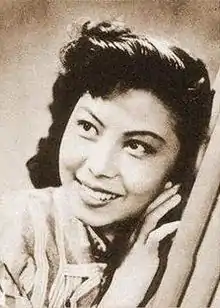Gong Qiuxia
Gong Qiuxia, also romanized as Kung Chiu-hsia, was born in 1916 under the name (龚莎莎 Gong Shasha and 龚秋香 Gong Qiuxiang) and died 2004, China. She was a famous movie star and singer. By the 1940s, she became one of the seven great singing stars.[1]
Gong Qiuxia | |||||||||||
|---|---|---|---|---|---|---|---|---|---|---|---|
 | |||||||||||
| Born | 4 December 1916 Chongming, Jiangsu (now Shanghai), China | ||||||||||
| Died | 7 September 2004 (aged 87) | ||||||||||
| Occupation | Actress, singer | ||||||||||
| Chinese name | |||||||||||
| Traditional Chinese | 龔秋霞 | ||||||||||
| Simplified Chinese | 龚秋霞 | ||||||||||
| |||||||||||
| Musical career | |||||||||||
| Genres | Shidaiqu, Mandopop | ||||||||||
Biography
In 1933, she traveled across Southeast Asia as a member of the Shanghai Plum Flower Troupe (梅花歌舞团). One of the theatrical plays she took part in was the Five Tiger Generals (五虎将).[1] As a result of her training, she was an accomplished tap dancer. Her early films would capitalize on this talent as one of the few Chinese female stars who was a triple-threat (acting, singing, dancing). People would affectionately refer to her as an older Shirley Temple.
Career
In 1936, she made her first film (父母子女, Father Mother Son Daughter). In 1937, she starred in the movie 压岁钱 and began taking a relatively serious attitude toward filmmaking. She is most recognized for playing the mature, housewife image.[1]
From 1938 to 1980, she took part in a number of movies. The movie 四千金 (Four Daughters) would earn her the nickname "Big Sister."[1]
In the 1930s, she was recognized as one of the three great mandopop singers with Zhou Xuan and Bai Hong.[1]
She died on 7 September 2004 in Hong Kong exactly ten years before fellow Seven great singing star Li Xianglan.[1]
Filmography
- (父母子女) (1936)
- (永远的微笑),(压岁钱),(古塔奇案),(四千金) (1937)
- (孤儿救母记),(恐怖之夜) (1938)
- (歌声泪痕),(播音台大血案) (1939)
- (鸾凤和鸣),(大地之花),(花溅泪) (1941)
- (蔷薇处处开),(黑夜魔影),(恨不相逢未嫁时),(博爱四姊妹),(浮云掩月) (1942)
- (千金怨),(难兄难弟),(激流),(夜长梦多),(来日方长),(京华旧梦),(凯风) (1943)
- (万户更新),(大地之花) (1945)
- (芦花翻白燕子飞) (1946)
- (四美图),(春花秋月) (1947)
- (花街荡妇),(心血),(染红海棠),(一代妖姬路) (1949)
- (南来雁),(新红楼梦),(狂风之夜),(禁婚记) (1950)
- (中秋月娘),(惹门),(不知道的父亲) (1951)
- (白日梦),(儿女经深闺),(梦里人),(寸草心) (1952)
- (水红菱),(都会交响曲),(姊妹曲),(大儿女经) (1953)
- (少女的烦恼),(我是一个女人),(女子公寓),(阖第光临),(孔雀开屏),(一年之计) (1955)
- (红颜劫),(男大当婚) (1956)
- (春归何处),(香喷喷的小姐),(王老五之恋),(眼儿媚),(未出嫁的妈妈),(情窦初开) (1957)
- (锦上添花),(有女怀春),(笑笑笑少年游),(春到海滨),(金屋梦),(豆蔻年华) (1958)
- (十七岁),(同命鸳鸯),(脂粉小霸王) (1959)
- (雷雨),(鸳梦重温),(雪地情仇) (1960)
- (美人计),(糊涂姻缘),(含苞待放) (1961)
- (沧海遗珠),(三笑) (1962)
- (龙凤呈祥),(椰林双妹),(合家欢) (1963)
- (小忽雷),(双枪黄英姑) (1965)
- (社会栋梁),(迎春花) (1966)
- (铁脚马眼神仙肚) (1978)
- (胭脂) (1980)
References
- Baidu. "Baidu." Gong Qiuxia. Retrieved on 28 April 2007.